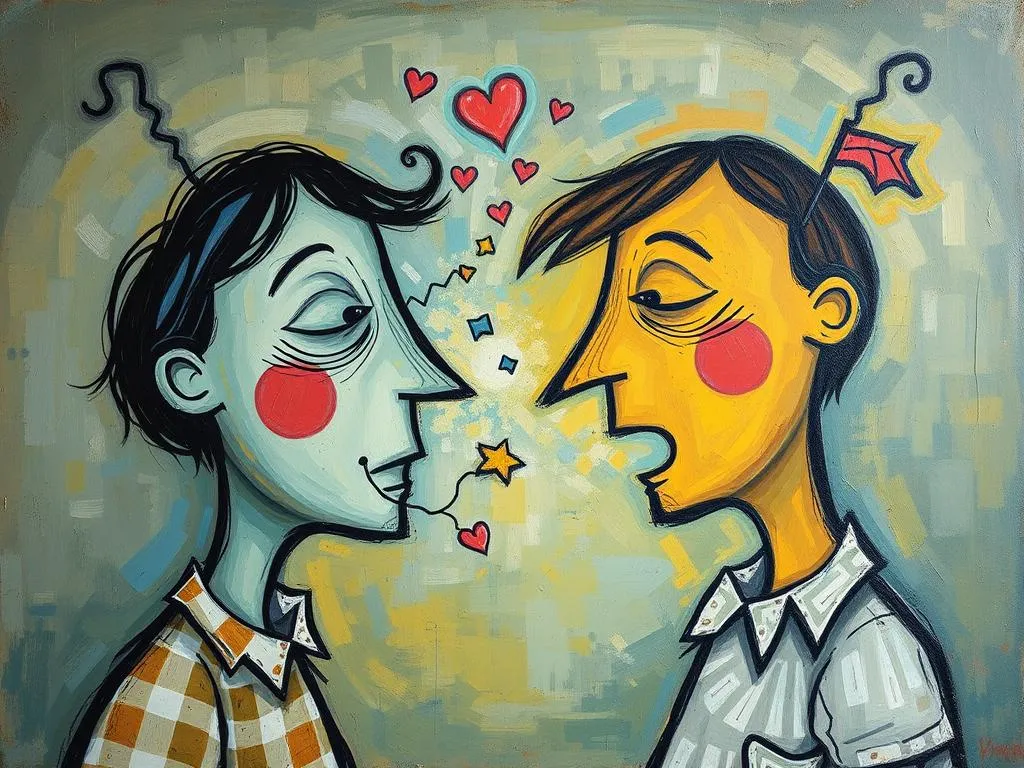
Introduction
Dreams about relationship crises can be both unsettling and illuminating. These dreams often reflect our subconscious thoughts, fears, and desires, particularly regarding our interpersonal connections. The relevance of such dreams is profound; they can serve as a mirror to our waking life, revealing underlying emotions and unresolved issues. For many, these dreams are not just random images but a powerful way to process feelings about love, commitment, and intimacy. Understanding the symbolism behind a relationship crisis dream can offer valuable insights into our emotional landscape and guide us toward healthier connections.
Symbolism and Meaning
At the heart of a relationship crisis dream, several symbols frequently emerge. These symbols can vary in their significance depending on the individual’s experiences and feelings. One of the most common symbols in these dreams is conflict. Conflict may manifest as arguments, misunderstandings, or feelings of betrayal. This symbol often reflects real-life tensions within a relationship or a fear of confrontation. It suggests that there may be unresolved issues that need addressing, whether within a romantic partnership or other significant relationships.
Another prevalent symbol is separation or distance. Dreaming of a partner moving away or feeling emotionally distant can signify anxieties about loss or a fear that the relationship is slipping away. This symbol can also represent internal feelings of isolation; it may not solely relate to the partner but rather to the dreamer’s sense of self within the relationship.
Additionally, the presence of third parties in these dreams—such as ex-partners, friends, or even strangers—can symbolize feelings of competition, jealousy, or insecurity. This suggests that the dreamer might feel threatened by external influences that could jeopardize their relationship. It is essential to consider how these figures are perceived in the dream, as they can reveal deeper fears about inadequacy or the dynamics at play in the dreamer’s waking life.
Emotional states during the dream are also significant. Feelings of anxiety, sadness, or anger can indicate that the dreamer is processing real-life emotions about their relationships. Conversely, feelings of relief or freedom in a crisis scenario might indicate a desire to break free from toxic patterns or relationships.
Understanding these symbols requires a personal introspection. Each individual’s experiences and emotional responses will shape the meaning behind their dreams, making it essential to consider personal context when interpreting these symbols.
Key Scenarios and Variations
The nature of relationship crisis dreams can vary widely, presenting different scenarios that influence their meaning. For instance, dreaming of a partner cheating can evoke intense feelings of betrayal and insecurity. This scenario often reflects the dreamer’s fears about trust or commitment. However, it might also indicate a need for greater honesty and transparency within the relationship. The dream can serve as a wake-up call, urging the dreamer to communicate openly with their partner about their feelings and insecurities.
Similarly, dreaming of breaking up or a partner leaving can create feelings of sadness or anxiety. This scenario might symbolize a fear of abandonment or a sense of inadequacy. Yet, it can also represent a desire for independence or a realization that the current relationship may not align with the dreamer’s needs. In this context, the dream serves as a catalyst for self-reflection, pushing the dreamer to evaluate their relationship and personal desires.
Another variation is the dream where the dreamer finds themselves in a love triangle. This complex scenario can signify internal conflict, as the dreamer navigates feelings of attraction to multiple partners or grapples with competing desires. This dream may reveal a struggle between commitment and freedom, urging the dreamer to assess their values and priorities in relationships.
Dreams featuring arguments with a partner can also differ in tone. If the argument is heated and emotional, it may reflect real-life tension that needs resolution. However, if the argument feels trivial or absurd, it might indicate that the dreamer is worried about minor issues being blown out of proportion. This scenario often highlights the need for effective communication and conflict resolution in waking life.
Moreover, the setting of the dream can provide additional context. A familiar place may evoke nostalgia or comfort, indicating that the dreamer values the connection. Conversely, an unfamiliar or chaotic setting might symbolize feelings of uncertainty or instability in their relationship. Each scenario and its nuances can reveal a lot about the dreamer’s current emotional state and relationship dynamics.
Real-Life Connections and Takeaways
Connecting dream scenarios to real-life situations can illuminate underlying issues and guide personal growth. When reflecting on relationship crisis dreams, it’s essential to engage in self-reflection. Consider what aspects of your waking life resonate with the dream. Are there unresolved conflicts or feelings of insecurity in your current relationships? Are you grappling with fears of abandonment or betrayal? By asking these questions, you can gain clarity on what the dream is conveying.
Practical advice for self-reflection includes journaling about your feelings and experiences related to your relationships. Writing can be a therapeutic way to process emotions and identify patterns in your behavior and feelings. It can also help you articulate your thoughts, making it easier to communicate effectively with your partner or loved ones.
Seeking open communication with your partner is another crucial takeaway. If a dream highlights specific anxieties or fears, discussing these feelings can foster greater understanding and intimacy. Expressing your concerns can prevent misunderstandings and strengthen your connection.
Additionally, consider the role of self-care in your life. Dreams about relationship crises can sometimes indicate that you are neglecting your own needs. Engaging in activities that promote personal well-being—whether through hobbies, exercise, or mindfulness practices—can help you feel more grounded and secure, both in yourself and your relationships.
Lastly, remember that dreams often serve as a reflection of our inner thoughts and emotions. While they can offer insights, they are not definitive predictors of the future. Instead, they provide an opportunity for growth and understanding. Embrace the lessons your dreams offer and use them as a tool for self-discovery.
Conclusion
Understanding relationship crisis dreams can provide profound insights into our emotional lives. By exploring the symbolism and various scenarios these dreams present, we uncover deeper truths about our fears, desires, and the dynamics at play in our relationships. These dreams are not merely reflections of our anxieties; they are invitations to engage in meaningful self-reflection and communication.
As you reflect on your relationship crisis dreams, consider what they reveal about your waking life. Use the insights gained to foster healthier connections and a deeper understanding of yourself. Ultimately, embracing the lessons from these dreams can lead to greater emotional clarity and fulfillment in your relationships. Remember, the journey of understanding oneself is ongoing, and every dream can be a stepping stone toward personal growth and healing.







